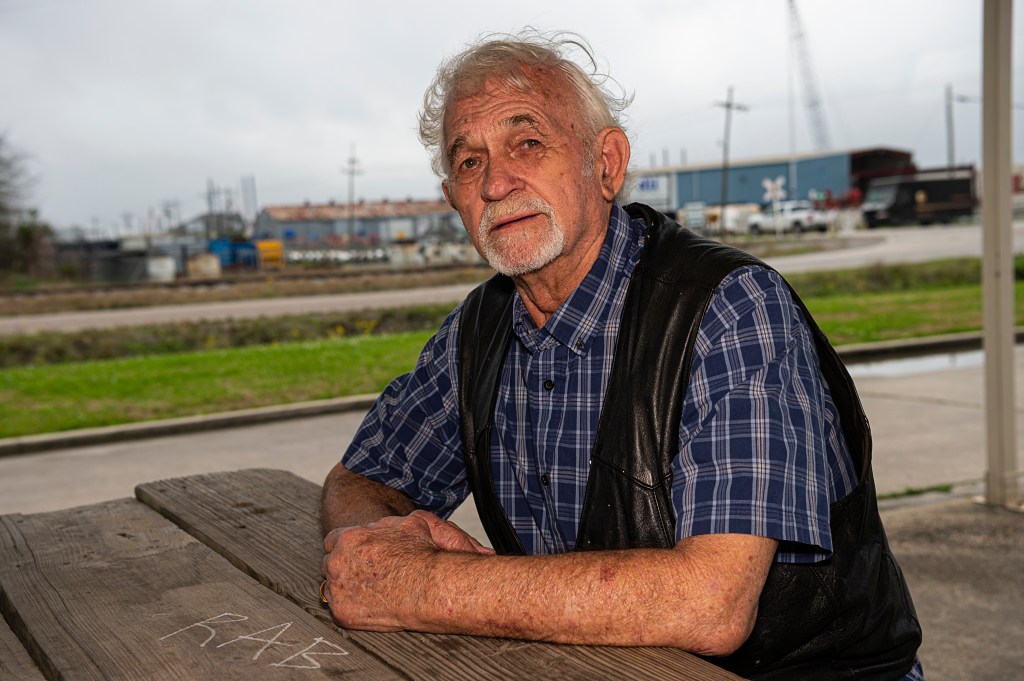One local’s true crime past inspires his new book
Published 7:00 am Monday, March 9, 2020

- Leonard Buteaux who was once Zorro the Notorious. Lee Ball Photography
At a Burger King, Leonard “Bot” Buteaux sat at a table with an erect posture and his hands resting in a polite manner on the table. A kind face is framed by neatly groomed gray hair and matching close-trimmed beard. Dressed in khaki pants and a navy lightweight windbreaker over a plaid shirt, the 80-year-old’s appearance gave no clue of the made-for-Lifetime life he had led many decades ago, including time in the infamous Angola State Penitentiary.
It’s a life that took the first wrong turn in 1957, when, at 16, Buteaux faked a birth certificate so that he could follow a high school friend into the Army. The Vietnam War had not yet begun when he completed boot camp, where he proved himself a good marksman. When his requests to be in special forces and “see action” like his friends were repeatedly denied, he left the Army without leave and returned home to Adeline, a small town about four miles from Jeanerette – or “J-Town,” as he calls it.
Back home, there was nothing but free time to hang out with three friends. Soon, the teens turned from beer and bonfires to making money by cattle rustling and then found it easier to come into cash by burglarizing and safe-cracking. It’s hard to imagine the now great-grandfather when he says, “We’d steal a car or truck and enter the back door at night.” A long streak of burglaries evolved into armed robberies, taking a few hostages along the way to assure their getaways, leaving them unharmed.
For two years, the group eluded police and were referred to as the “notorious gang” among law enforcement. The letter “Z” carved at some of the crime scenes was presumed to have been the mark of the group’s leader who police called Zorro- thought to be Buteaux. But, Buteaux never considered himself the leader.
Before it was over, the teens had committed crimes in Iberia, Vermilion, St. Martin and St. Mary Parish. Buteaux and his buddies were finally arrested and after the convictions came down – including attempted murder – they were each sentenced to 105 years, with 25 to be spent in Angola State Penitentiary.
In 1959, a barely 20-year-old Buteaux entered what was long considered one of the most violent prisons in the country. He recalls his first day, and the slow walk to the maximum-security dormitory, Pine One, where he would share bed space with 50 cell mates. Along the way, he saw a man holding his arm with a blood-soaked shirt. “I never saw that much blood coming from a human being,” he recalls. As he walked into the dormitory, an old man, sitting at a table writing a letter, looked up and said, “Welcome to Hell.”
Little did Buteaux know that the phrase would inspire the title of a book he would later write chronicling his time in the penitentiary.
Life as he knew it would change and so would his name. That first day, Buteaux got his nickname “Bot,” given to him by one of the men in charge who repeatedly pronounced Buteaux as Boto. He shortened it to Bot.
“Two weeks into prison, I found out what hell was,” says Buteaux, who was beaten so badly that he was given four days off from his work cutting sugar cane in the fields. The experience was his education of two rival gangs, the Urbs and the Hoosiers. Members of the Urbs considered Buteaux a threat because they thought he was the leader of a gang, and continued to attack him.
“I was looking over my shoulder all the time. You lived like an animal and your instincts kicked in fast,” says Buteaux. He shows a scar on his left arm from a shank attack (homemade knife). Another on his right shoulder. The small indention on his scalp made by a barbell.
“The options were fight and live or fight and die. I got mean and decided to get in shape,” says Buteaux. “I started running in the yard every chance I got and I joined the boxing team.” Before the Angola Prison Rodeo was popularized, boxing was the big sport. Buteaux, who grew up a street fighter, fought in Angola’s light heavyweight division, eventually winning his way to the champion title. It was in boxing where he met his best friend on the inside, his manager Mot.
Nights were spent with one eye open, waiting for the imminent attack by an Urb. “Everyone went to bed with their shank – the only friend you could rely on,” he says.
Visits from his parents and thoughts about home helped Buteaux. “The only time you had a good day was when someone visited you and then you’d step back in the shadows again.”
A ray of sunshine came one day when Mot’s sister visited him and caught Buteaux’s eye. The thought of meeting her one day when he was free was what he needed to press on at working towards a future after prison.
With not much of an education, he decided to attend the prison’s school. “I bought my way to the head of the waitin’ list with a half pack of Bugler tobacco,” Buteaux says. Soon after passing his 11th grade equivalency test, he took up drafting, learning to read engineering drawings and spool pipe. He caught on quick and attended welding school and then paint school, taking in all the education he could.
After five and a half years in Angola, on a cloudy day, Buteaux was released on parole. “I got to the front gate, dropped to the ground, and made the sign of the cross,” he gestures with his hand. “But I was more scared than when I went in, not knowing what I was going to face. I knew I’d never go back though.”
His first meal as a free man was white beans and rice. His first job was painting signs in Jeanerette, an opportunity given to him by the mayor that he never forgot.
Three months later a job opened up with a local boat company, welding hulls. In the meantime, he looked up his friend Mot, who had been released before him, and he finally met Mot’s sister, Lou. They married a year later.
While working offshore, his detailed spool sheets got the attention of some engineers. He eventually became a welding and paint inspector and went on to do that work for 40 years, gaining respect in a field where inspectors “weren’t looked upon too kindly.”
Buteaux says the knowledge he gained in prison led him to doing work that took him halfway across the world, supervising inspections in areas like Israel, Jerusalem and the Sinai Desert.
He and Lou had six children, in addition to the two from his first marriage. They were married for 53 years before Lou died 11 months ago. Buteaux twists his wedding ring as he speaks fondly of his wife and best friend. “I spent what seemed like three months on the porch after she died.”
Two years ago, Buteaux sat down to write his story in a book that was published at the end of January. Written with the assistance of ghost writers, “Welcome to Hell” was intended to give hope to anyone who has been arrested or gone to a penitentiary that they can turn their life around like Buteaux did. The page-turner is available at Barnes & Noble.
For the most part, Buteaux has made peace with his past. “To this day, I regret the crimes I committed; I don’t know why I did them.”
Recently retired, he plans to spend more time with family and do more fishing. “I love to fish; I still have a party barge that I built for Lou so she could sit in her chair steady while on the water,” he says as he sits on the porch that always brings him to a happy place.
Breakout
The book inspired by Buteaux’s life, “Welcome to Hell,” is available at Barnes & Noble





